Colloquia for Spring 2022
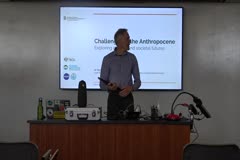
"Challenges in the Anthropocene: Exploring climate and societal futures"
May 09, 2022
Patrick Keys
Hosted by Jeff Collett and Eric Maloney
In the Anthropocene — the current period of time in which humanity has taken the reins of planetary control — we will grapple with emergent challenges at the interface of climate and society. In this talk, I will explore some of these Anthropocene challenges. First, I will present work exploring how climate and land-use change interact with one another, leading to obstacles for future…
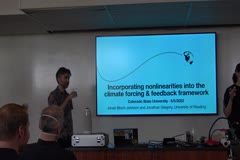
"Incorporating nonlinearities into the climate forcing and feedback framework"
May 05, 2022
Jonah Bloch-Johnson
Hosted by Maria Rugenstein
In this talk, I use a series of coupled and atmosphere-only simulations of the HadCM3 GCM to illustrate how the traditional climate forcing and feedback framework can be extended to incorporate the climate nonlinearities needed to forecast warming in the coming century. Studies of global warming often employ an energy balance model in which perturbations to the net planetary energy flow are…
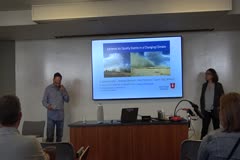
"Extreme Air Quality Events in a Changing Climate"
April 28, 2022
Gannet Hallar
Hosted by Paul DeMott
How is climate change impacting extreme air quality events in the Western U.S.? Over recent decades, wildfire activity across western North America has increased in concert with summertime air quality degradation. At the same time climate change and land use are altering the landscape of the U.S. Great Plains, producing increases in windblown dust. Our research uses satellite data combined…
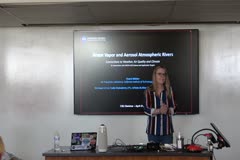
"Water and Aerosol Atmospheric Rivers: Connections to Weather, Air Quality and Climate"
April 21, 2022
Duane Waliser
Hosted by Sue van den Heever
This presentation will highlight the intersections between the science and societal impacts associated with atmospheric rivers (ARs) and the science and applications objectives targeted by NASA’s proposed Atmosphere Observing System (AOS) mission [formerly referred to as Aerosol, Clouds, Convection and Precipitation (ACCP)]. The discussion of ARs will include both their traditional form,…
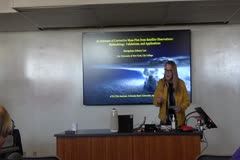
"An Estimate of Convective Mass Flux from Satellite Observations: Methodology, Validations, and Applications to Convective Dynamics Studies"
April 18, 2022
Zhengzhao Johnny Luo
Hosted by Sue van den Heever
Most current GCM cumulus parameterization schemes are based on the concept of convective mass flux. Yet, no global observations of this critical parameter exist at this time. To fill the vacuum, we developed a novel, satellite-based method to retrieve convective mass flux. The method is a hybrid approach that blends multiple information across the scales, including satellite observations of…
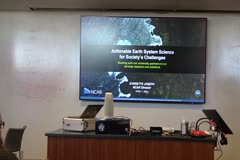
"Actionable Earth system science for society’s challenges"
April 07, 2022
Everette Joseph
Hosted by Dave Randall
NCAR Director Everette Joseph will discuss how NCAR is positioning itself to ensure that its science is meeting the needs of a society facing unprecedented environmental challenges. Joseph will discuss how NCAR is leading and enabling the community, its latest projects and opportunities for collaboration, and how the center is working to develop a more diverse workforce for the future. He will…
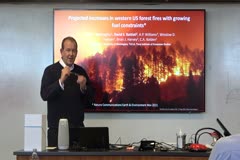
"Projected increases in western US forest fires with growing fuel constraints"
April 07, 2022
David S. Battisti
Hosted by Jim Hurrell
The annual forested area that has burned in the western US has increased markedly in the past 40 years. Here we examine the causes and present 30-year projections of future area burned due to climate change, including the potential for fire-fuel feedbacks to limit future fire area burned.
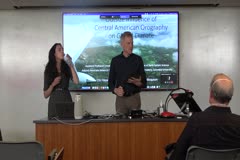
"Outsize Influence of Central American Orography on Global Climate"
March 31, 2022
Jane W. Baldwin
Hosted by Eric Maloney
The Sierra Madre mountain range stretches north to south in Central America. These narrow mountains are important for climate due to their location: they block tropical winds that flow east to west, from the Atlantic to the Pacific, making winds slower and sea surface temperatures warmer in the tropical East Pacific. In this seminar, I will demonstrate the substantial role of these mountains…
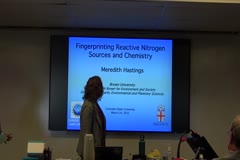
"Fingerprinting Reactive Nitrogen Sources and Chemistry"
March 24, 2022
Meredith Hastings
Hosted by Jeff Collett
***Please Note** ****This colloquium was recorded without sound **** "Fingerprinting Reactive Nitrogen Sources and Chemistry" Meredith Hastings is a Professor in the Department of Earth, Environmental, and Planetary Sciences at Brown University. She has a joint appointment with and currently serves as Deputy Director of the Institute at Brown for Environment and Society. Reactive…
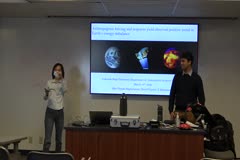
“Anthropogenic forcing and response yield observed positive trend in Earth's energy imbalance"
March 10, 2022
Priyam Raghuraman
Hosted by Christine Chiu
The observed trend in Earth’s energy imbalance (TEEI), a measure of the acceleration of heat uptake by the planet, is a fundamental indicator of perturbations to climate. Satellite observations (2001–2020) reveal a significant positive globally-averaged TEEI, but the contributing drivers have yet to be understood. Using climate model simulations, we show that it is exceptionally unlikely…
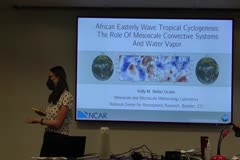
"African Easterly Wave Tropical Cyclogenesis: The Role of Mesoscale Convective Systems and Water Vapor"
March 03, 2022
Kelly M. Nunez Ocasio
Hosted by Emily Gordon
Tropical cyclogenesis (TCG) is the process where a tropical cyclone seedling that is coupled to deep convection develops into a tropical cyclone (TC). African easterly waves (AEWs) are an example of such TC seedlings, and, just like TCs and mesoscale convective systems (MCSs), they are high-impact weather events that affect the livelihood of communities over Africa and the tropical Atlantic.…
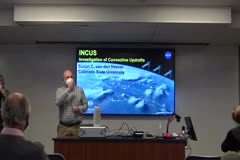
"The INCUS Mission"
February 24, 2022
Susan van den Heever
Hosted by Jeff Collett
The Investigation of Convective Updrafts (INCUS) is a recently selected NASA Earth Ventures Mission. The overarching goal of INCUS is to understand why, when and where tropical convective storms form, and why only some storms produce extreme weather. Life on Earth is bound to convective storms, from the fresh water they supply to the extreme weather they produce. Convective storms facilitate…
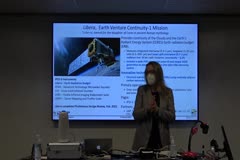
"Libera’s Contributions to ERB Continuity and Advances in Earth’s Energy Budget Research "
February 17, 2022
Peter Pilewski and Maria Hakuba
Hosted by Sue van den Heever
The Libera Mission, named for the daughter of Ceres in Roman mythology, will provide continuity of the Clouds and the Earth’s Radiant Energy System (CERES) Earth radiation budget (ERB) observations from space. Libera’s attributes enable a seamless extension of the ERB climate data record. Libera will acquire integrated radiance over the CERES FM6-heritage broad spectral bands in the…
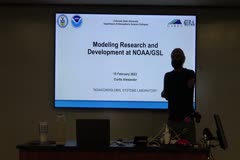
"Modeling Research and Development at NOAA/GSL"
February 10, 2022
Curtis Alexander
Hosted by Chris Kummerow
The Global Systems Laboratory (GSL) in NOAA seeks to improve numerical prediction (NWP) across all weather hazards including severe convective weather, intense rainfall, winter storms, landfalling tropical systems and other phenomena such as smoke from wildfires. GSL’s vision is “Research today for better forecasts tomorrow” with stakeholder interests across a diverse portfolio including…
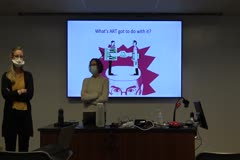
"What's Art Got to Do With It?"
February 03, 2022
Erika Osborne
Hosted by Bonne Ford
The field of environmental arts has been expanding rapidly as the health of the planet grows increasingly precarious. As the field expands, a focus on the intersection of art and science has come to the forefront of creative dialog. Furthermore, there is a growing understanding in scientific arenas that artists are integral, not peripheral, to solving the complex environmental and social…
